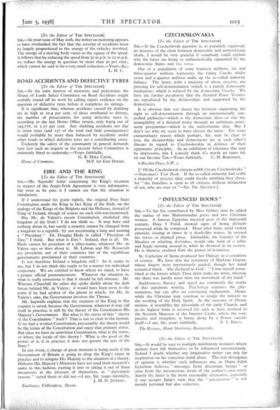" INFLUENCED BOOKS "
[To the Editor of THE SPECTATOR] Sm,—To the list contributed by Miss Gibbes may be added the names of two Muhammadan poets and two Christian women. A famous Egyptian mystical poet of the thirteenth
century, Ibnu Farid, showed signs of being divinely possessed while he composed. Hour after hour, amid violent emotion, issuing at times in a death-like trance, he uttered his verses or rhymed prose. Jalaluddin, the founder of the Maulavi or whirling dervishes, would take hold of a pillar and begin turning around it, while he dictated in an ecstasy. He is likewise credited With the power of levitation.
St. Catherine of Siena produced her Dialogo in a condition of ecstasy. We have also the testimony of Madame Guyon, whose fingers 'were mysteriously guided, though her mind remained blank. She declared to God : " I was myself aston- ished at the letters which Thou didst make me write, wherein my share was hardly more than the movement of my hand."
Suddenness, fluency and speed are commonly the marks of this automatic writing. Psychology registers the phe- nomenon, but can offer no convincing explanation. Mean- while the Christian may continue to assign the miracle to the working of the Holy Spirit. As the outcome of Divine motion, it resembles the glossolalia of the early Church, and in its highest form is reserved for such as have attained to the Seventh Mansion of the Interior Castle, where the soul, passive and receptive, is borne along by a Power outside itself. —I am, Sir, yours faithfully, E. J. BOLUS.
The Rectory, Monk Sherborne, Basingstoke.


















































 Previous page
Previous page